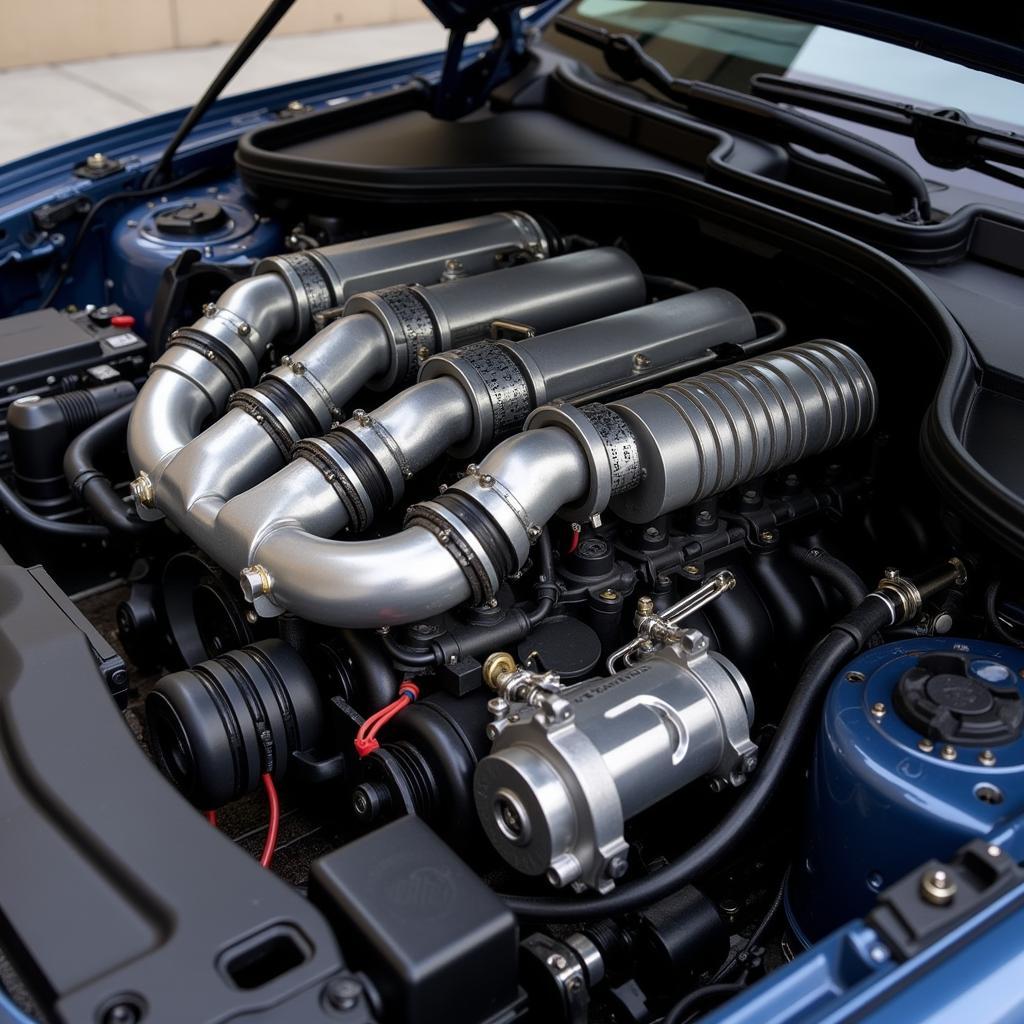The roar of a BMW M5 V10 engine is instantly recognizable. It’s a sound that evokes images of high-performance driving and cutting-edge German engineering. This article delves into the magic behind the bmw m5 v10 sound, exploring its technical origins, cultural impact, and what owners and enthusiasts need to know about maintaining this iconic engine.
What Makes the BMW M5 V10 Sound So Special?
The heart of the E60 BMW M5, produced from 2005 to 2010, is the naturally aspirated S85 5.0-liter V10 engine. This high-revving marvel is a masterpiece of engineering, capable of producing over 500 horsepower and a spine-tingling symphony of mechanical noise. Unlike turbocharged engines, which often have a more muted exhaust note, the naturally aspirated V10 sings with a raw, unfiltered intensity. The individual throttle bodies, one for each cylinder, contribute to the sharp throttle response and the distinct, high-pitched wail as the engine climbs towards its 8,250 rpm redline.
 BMW M5 V10 Engine Bay Detail
BMW M5 V10 Engine Bay Detail
Maintaining the Perfect BMW M5 V10 Sound
Preserving the legendary bmw m5 v10 sound requires diligent maintenance. Regular oil changes with high-quality synthetic oil are crucial, as is using the correct oil filter. Spark plugs should be replaced according to the manufacturer’s recommendations. Ignoring these maintenance tasks can lead to performance issues and potentially affect the engine’s distinctive sound. Furthermore, any modifications to the exhaust system should be carefully considered, as some aftermarket parts can negatively impact the engine’s performance and sound quality. Similar to [bmw e60 m5 exhaust sound], this engine requires specific care.
Common Issues Affecting the BMW M5 V10 Sound
Several issues can affect the sound of the BMW M5 V10. Exhaust leaks can create a hissing or rasping sound, while worn-out throttle position sensors can cause rough idling and erratic throttle response, potentially affecting the engine’s distinctive high-pitched wail. A failing rod bearing, a known issue with the S85 engine, can lead to a knocking sound, which is a sign of serious engine damage. If you notice any unusual noises, it’s essential to have your vehicle inspected by a qualified technician immediately. As you can find on [2006 bmw m5 exhaust sound], these issues can sometimes be specific to the model year.
Is the BMW M5 V10 Sound Worth the Hype?
Absolutely! For many automotive enthusiasts, the bmw m5 v10 sound is the pinnacle of automotive auditory pleasure. It’s a sound that represents a golden era of naturally aspirated engines, a time before turbocharging and downsizing became the norm. This unique sound is a significant part of what makes the E60 M5 such a desirable and collectible car. Just like the [top gear bg audio bmw], this car evokes strong emotions.
Why is the BMW M5 V10’s Sound so Addictive?
The S85 engine’s unique firing order creates a complex and layered sound that is both powerful and refined. It’s a blend of mechanical precision and raw power that’s unlike anything else on the road. This symphony of sound, combined with the car’s impressive performance, creates a visceral driving experience that is truly addictive. Similar to [bmw v10 engine sound], it’s a truly unique experience.
Conclusion
The bmw m5 v10 sound is a testament to the ingenuity of BMW’s engineers. It’s a sound that embodies performance, precision, and pure driving pleasure. Maintaining this iconic engine requires proper care and attention, but the reward is a symphony of power that will continue to thrill drivers for years to come. This unique sound signature, often compared to the [bmw m5 e60 top gear bg audio], makes it a highly sought-after vehicle for enthusiasts.
FAQ
- What type of oil is recommended for the BMW M5 V10? High-quality synthetic oil meeting BMW’s specifications.
- How often should the spark plugs be replaced? According to BMW’s maintenance schedule.
- What is a common issue with the S85 engine? Rod bearing failure.
- What are the signs of an exhaust leak? A hissing or rasping sound.
- Why is the S85 engine’s sound so unique? Its naturally aspirated design, individual throttle bodies, and unique firing order.
- What year did the E60 M5 production end? 2010.
- What is the redline of the S85 engine? 8,250 rpm.
For further information, check out these resources: [bmw v10 engine sound], [bmw e60 m5 exhaust sound].
Need assistance with your BMW M5 V10? Contact us via Whatsapp: +1 (641) 206-8880, Email: CARDIAGTECH[email protected] or visit us at 276 Reock St, City of Orange, NJ 07050, United States. Our customer service team is available 24/7.
